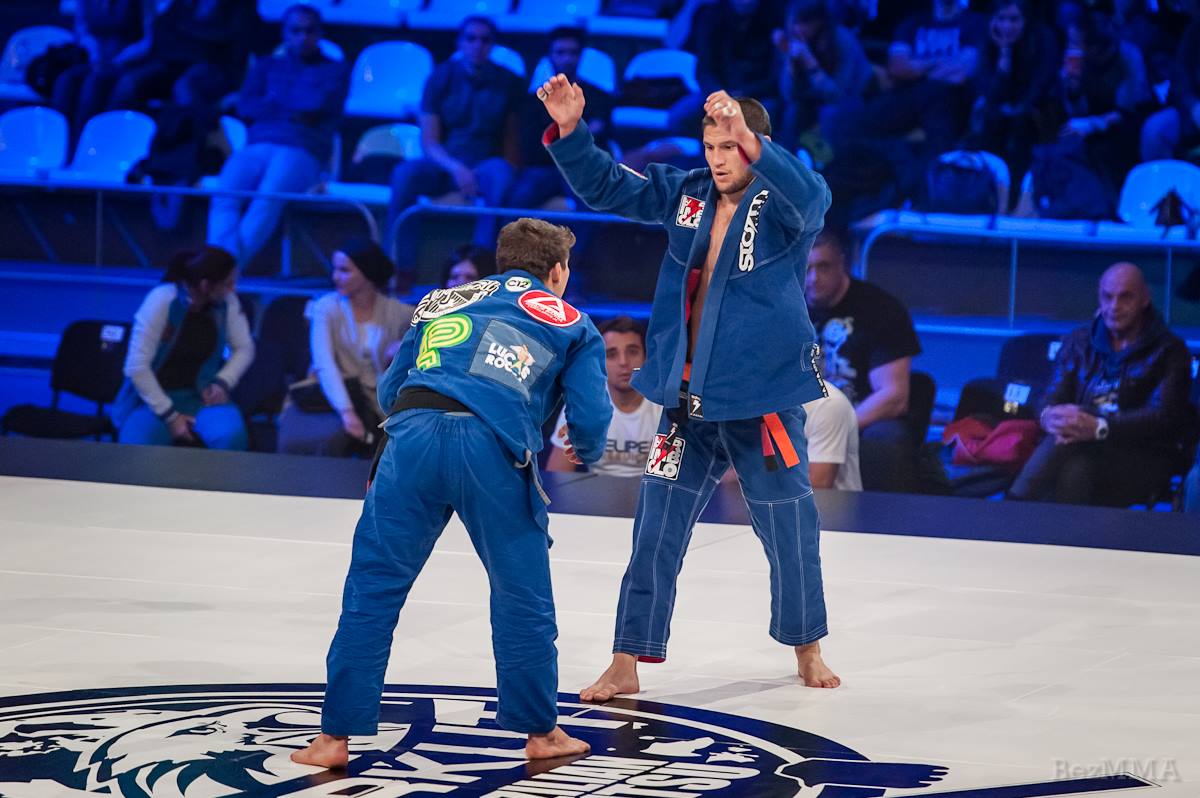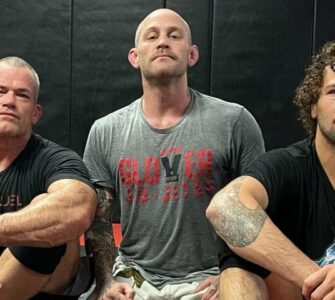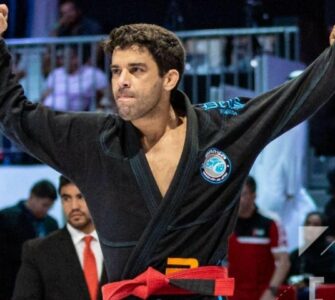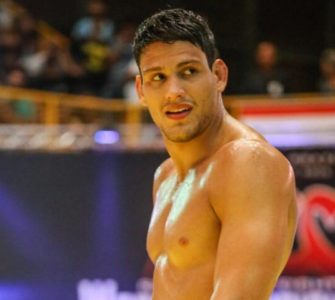Claudio Calasans Camargo is both a Judo and a Brazilian Jiu Jitsu black belt, representing the Atos Jiu Jitsu team and the Calasans Camargo Gym. His father is a seventh degree black belt in Judo himself, and was one of the driving forces in Claudio’s life that got him to become a World Champion, ADCC Champion, as well as to take on many other titles throughout his career.
We spoke with Claudio about his early starts in Judo (at three years old!) and Jiu Jitsu, his father’s influence on his path, the importance of honing the mental and emotional sharpness before competition and about the importance of dedication and hard work for BJJ success.
BJJEE: It is our pleasure to have you as a part of this interview, Claudio. We’re not sure how many of our readers know about this, but you have had a particular background prior to starting BJJ – you have started training Judo at the age of three!
This is now wonder, since your father, Calasans Camargo, is a big name in Judo himself – he is a 7th degree black belt now.
Could you tell us a bit on how was it that you transitioned from Judo to Jiu Jitsu?
Claudio: I have been training for many years. I started when I was three years old, and it was especially because of my father. He was a black belt and a Master at that time, and now he’s a 7th degree black belt.
So, my brothers and I have been training since we were kids. We were basically born on the mat… Today, all of us, my brothers and I, are black belts in Brazilian Jiu Jitsu and Judo.
So, I started training Judo from early age. When I was around 15 or 16 years old, I started working on Jiu Jitsu in order to improve my ground game. We have all realized that ground game is very important in Judo and that has been one of the main reasons why I started training Jiu Jitsu… But, most importantly, it was because the submissions start being being allowed in Judo after this age. And my father knew very clearly that having this knowledge would greatly improve my chances of success.
BJJEE: So, your father was also the one who influenced you to start training Jiu Jitsu as well?
Claudio: Yes. It was at that time, in 1992, that my father went to the Olympic Games in Barcelona, as a part of the coaching staff… My father also had cauliflower ears from training the ground game. He has also been practicing Jiu Jitsu for a long time and he likes it a lot.
In that period, a lot of people would come and ask him if there would be more Jiu Jitsu fighters. There were all these people walking around with these BJJ shirts… So my father realized how big this sport was becoming.
So, when he came back to Brazil, he talked with my brothers and I about the importance of practicing Jiu Jitsu – not just to improve our Judo, but also because it was evident to him so as to how big of a potential BJJ had in the future; as a sport that would probably achieve very high levels of popularity.
So, he really advised us to start working harder on this.
BJJEE: And when was it that you started competing in BJJ, rather than Judo?
Claudio: I started competing as a blue belt in BJJ and continued to do so through purple and brown… I was already in love with the sport, but it was only when I got my black belt that I realized how much I wanted to be the number one and that I wanted to put all of my effort into this… And to become one of those number one names who represent the sport.
BJJEE: You have certainly became one of the number one names! But, let’s go back a bit to your beginnings. Can you remember, what was it like when you first started training Jiu Jitsu? Where did you train, who were your coaches?
Claudio: When I started training Jiu Jitsu, there were no black belts in my town and so my father had to find a solution for that. And, at that time, he found a guy in São Paulo. São Paulo is about 100km from our city. And this instructor would come every Tuesday and Thursday to work in our gym. So, I would train with him during these two days.
I trained with that instructor for about two years and my father wanted him to come and live here in São José, because there was a huge demand in our gym at that time. The mats were full of people, looking to train at just about any time of the day; so, my dad gave him a job offer. He wanted him to come here and work with us full-time… But, unfortunately, at that time he had to turn that job offer down.
So, we had to look for a plan B. And that’s when we found Erivaldo Junior. When I first started training with him, he was just a purple belt. And as I progressed, he was always one belt above me; so, when I was a blue belt, he was a purple belt and when he got his brown belt, I received my purple, and so on consecutively. I got my black belt from him in 2005, and I trained with him up until 2008.
BJJEE: And how was it like to train with Erivaldo?
Claudio: At the beginning, he would come to our gym every Tuesday and Thursday. And on Mondays, Wednesdays and Fridays, I would go to his gym… Well, it was not exactly a gym. His father – who is also called Erivaldo – and him had mats in their place, in their house. And they still have the mats there, and there’s still training happening at this place.
I would go there by bicycle. It would take me half an hour to get to this place by bike; and I trained there for a long time, up until something close to 2009. It was then that I had joined Atos.
BJJEE: So, was it at this time – when you had joined Atos – that you have realized that you wanted to become a world-class competitor? Or was it something that you knew earlier?
Claudio: I’ve always wanted to become a black belt competitor. I didn’t put a lot of importance on becoming a world champion at blue belt or purple belt… I mean, I did compete; but I wanted to be a world champion black belt, not exactly one at the lower belts.
And in the first year after I got my black belt in 2005, I’ve achieved some very good results and got the third place in the World’s Championship. There was another competition that happened at that time, actually, which was basically with the same fighters that would go to the world championships. That tournament was called something like a „World Cup“ – and I was a champion in this one!
But, that period was also a bit difficult for me because I had to juggle between Judo and Jiu Jitsu. I couldn’t exactly put all of my focus on Jiu Jitsu. And I was also having a two-way thinking process, if I’m being honest… It was like – what do I really want? Do I want to focus 100% on Judo or Jiu Jitsu? And then, in 2009, I made up my mind and I decided to go with 100% in BJJ.
At this time, I started looking for a team that I would be able to train with on a more professional level… To train with like-minded people that want to compete at the highest level possible. And that’s when I decided to join Atos and train with them.
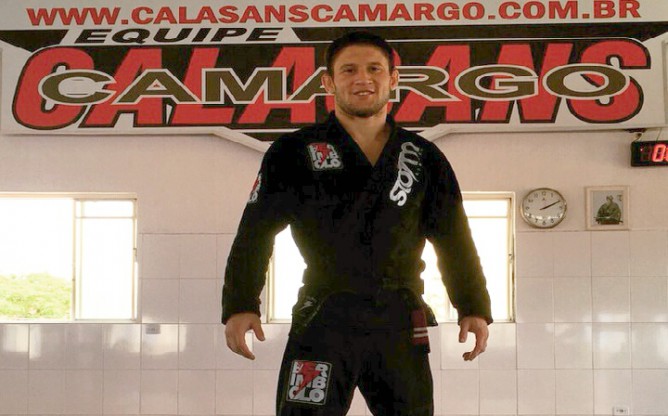
BJJEE: And Atos has really set you up for a professional, higher-level performance.
Claudio: Yes, I was off to a good start then, I achieved some good results. I was a Pan-American Champion, a European Champion and had many other successes…
But, the World Championship – I was always so close to getting the gold at the World Championships! I would always miss due to small mistakes. I reached the finals three times, and I lost all three of them. They were in 2010, 2012, and 2013. And I took second place in all three instances.
That’s when I started with the coaching process. And the coaching process was different for me, in comparison to the other athletes, because… Well, for example, the first time I competed was when I was 5 years old. So, it was very common for me to take a bus as a child and go to one competition on a Saturday and then take another bus for another competition on Sunday… So, by the time I had received my black belt, I have somehow lost the adrenaline – which is very important for competitors to have, in order to possess this edge when competing… And even when training.
Of course, it is not good for a competitor to be very relaxed and to feel as if he’s in his own gym, just doing a regular training session. But, it’s also not good to be over-excited for a competition… So, neither of them is good – and I was working on finding the correct balance between the two.
If I felt as if I was training in my gym, then I would tend not to start the match the way I should have started it. It would lead me to situations where I was lagging behind on the scorecard and where there was not enough time for me to catch up or to reverse the score.
So, my coaching period helped me with exactly that. With striking a balance between these things that I mentioned. And, as I’ve said in the beginning, it was very different for me to find this balance than it is for most competitors.
Because, the majority of competitors struggle with being over excited before a match and with not being able to perform well. But, for me it was the opposite; I wasn’t performing well because I would start the match by being too calm… And then, I would only be able to find my right rhythm during the match. Coaching has helped me to perform at my best from the beginning to the end of every match.
BJJEE: So, this sort of balance has led to you achieving all of those awesome results, including the World Championship. What would you say are the other keys to success, that you believe have made you into a champion?
Claudio: Yes, thank God. I was able to achieve much more than I could have ever imagined when I started thinking of becoming a professional Jiu Jitsu fighter. I’ve won the World Championship – the most important championship of the world.
It wasn’t once that I have thought, since I’d started training, that I wouldn’t be able to achieve all of this. And I am very glad that I did.
I truly believe that all of this is the fruit of my work and my dedication… I always dive into whatever I do and I think that is the key to my success. I do my best and I believe that’s why I’ve achieved all of the results I did.
Most importantly, you need to love what you do. If you love what you do, then everything is easier, then it’s easy to dedicate yourself to your goal. And that is why I give my best on the mats, on the training sessions… That’s why, when I wake up the next day with a very sore body and when I’m very much in pain – that’s why it all makes sense then.
I’m also not the type of person that complains a lot. For example, when I speak about the pain – for me, it is very clear that if there’s no pain, then there’s no gain. So I do my best to achieve that which I want to achieve.
It’s like the old saying that goes like: „You reap what you sow.“ And that is exactly what I believe in and what motivated me… Because, when you love what you do and do your best, the results will come. And it also comes from doing that which you know you need to do, which people know they need to do; but which they sometimes evade doing… For example, you know that you have to do your best and to give everything you have in order to achieve the first place. If you don’t do that, you’re not going to be the first one, but in the second place. So, giving everything that you’ve got is the key.
BJJEE: So, giving one’s absolute best is the key to success?
Claudio: Whenever you decide to do something… Even if it is resting, even then you need to do your best and be a champion at resting. If you want to eat well and have good eating habits, then do your best to be the world champion in that. If you want to run, then do your best and dive right into it… The results are going to come!
This applies across the board, to every profession. And if you want to be the best in your profession, you have to walk the talk. The attitude is what matters most. And if you walk the talk, you will be able to achieve the best results.
BJJEE: Thank you for sharing that perspective with us, Claudio. You aren’t just „walking the talk“ as a competitor, but you are also a great coach. So, what is it that you do when coaching your students, that you think makes them better than others?
Claudio: There’s definitely a big difference between training someone and coaching someone.
We have both sides here at my gym. We have „regular training“ for any person that wants to practice Jiu Jitsu; but we also have the „competition-focused“ training sessions as well. And it is interesting that, when we’re training competitors to compete, we have very different training sessions than it is the case in the regular ones.
For example, when we have sparring sessions, they hardly ever do any kind of drills or any kind of technique-focused exercises. We simply focus a lot on sparring on those days and the drills just end up being done as a warm-up or similar, not exactly as a big part of the session. And this is very different from a regular training session for the regular student.
A competitor needs to be training much more and doing everything that he has to do. He has to be able to do a whole session of sparring; and then, probably, a whole session of drills… It takes much more time as opposed to the other, regular guy who just does a little bit of everything in one training session.
BJJEE: So, what would you say is important to know for those that want to compete at higher levels?
Claudio: If a person wants to compete at a higher level, I strongly believe that he needs to be prepared physically, technically, emotionally and tactically. This is a set of skills that you need to have. And you need to train each and every one of them, with a lot of attention to details.
Obviously, the mental and emotional state of an athlete is paramount at a competition. Because, often times you see an athlete with a very high degree of technique and skill, someone who’s really good; but who’s not emotionally and mentally prepared. So, he gets outperformed by someone who is sometimes not even nearly as good as he or she is, technique-wise. But the thing is that the other person had good emotional control over themselves and was able to use it to his or her own favor.
I advise my students and competitors that they need to be 100% focused on what they have to do, and that they have to train for that. For example, if you want to go out there and you’re aware that you’re capable of tapping everyone out with an armbar – then you should train a lot in this direction.
Doing your best is not enough, as I said, if you are not physically, technically, emotionally and technically prepared. So, I believe and always advise people that all of these skills, comprised together, make up a great athlete.
Sometimes, you overlook or you don’t give enough attention to one of these skills, perhaps because you think that it is not as necessary. And because you’re not balanced, you end up not doing your best. You don’t get the result that you were looking for. So you have to train yourself in all of them.
I have an interesting example that happened this year, actually. I have an athlete who was a blue belt World Champion this year. Interestingly, he has been to a lot of different competitions this year, and he would almost achieve his target – which was to become a champion at a specific tournament – but he would end up losing. For example, he took third place in the ADCC. He got a medal in the Pan-American Championship…
As a coach, I had to work to keep his mind focused – despite these non-ideal results. We had to find reasons to keep going, knowing that if he keeps working towards his objective and if he keeps honing his skills in all of the pillars that he has, that the result will eventually come. And each time that he had lost, it was evident to me – and I had to make sure that he sees it clearly as well – that, sometimes, it is just a detail that was missing. And that we had to go back to the gym and work hard to avoid this same mistake the next time… And, as I’ve said, through this sort of an approach he was able to become a World Champion, something which was exactly what he was looking for.
All of the skills I’ve mentioned above make an athlete into a perfect one and into a winner. But, the coach has to help his athletes to keep their focus and to keep them motivated to achieve great results.
BJJEE: So it all comprises a complete picture, awesome! Before we conclude this interview – we’re running out of time – would you mind sharing with us your future plans? Will you keep on competing?
Claudio: The time has come for me to consider what the next step is. This is especially since I am not a kid anymore… I have been a black belt since 2005 and it has been a long journey, I have achieved a lot. It is time to think about the next steps.
Right now, I am 36 years old. At this age, it’s not like when you’re younger: when, if you’re injured, you can just stop for one, two or three weeks and then just come back. When you’re at my age, it’s not as simple as it used to be. I’m thinking about this a lot.
I could do superfights, for sure, I could do those kinds of events. And I want to select which ones I want to be a part of in 2020, as I need to be more selective with tournaments nowadays. That’s due to the fact that I’m no longer able to participate in a lot of them, as I used to when I was younger.
I’m also considering having some specific fights with some specific fighters that I want to fight against, for the next year.
As long as I’m able to compete at a high level and to put up a good fight, I will keep doing what I love to do. It’s something that motivates me and it is something that I want to continue doing for as long as I am doing it at a high level. I will just keep on doing my best!
BJJEE: Thank you for your time, Claudio. It has been a great pleasure of ours!
Claudio: You are welcome and thank you! Oss!

